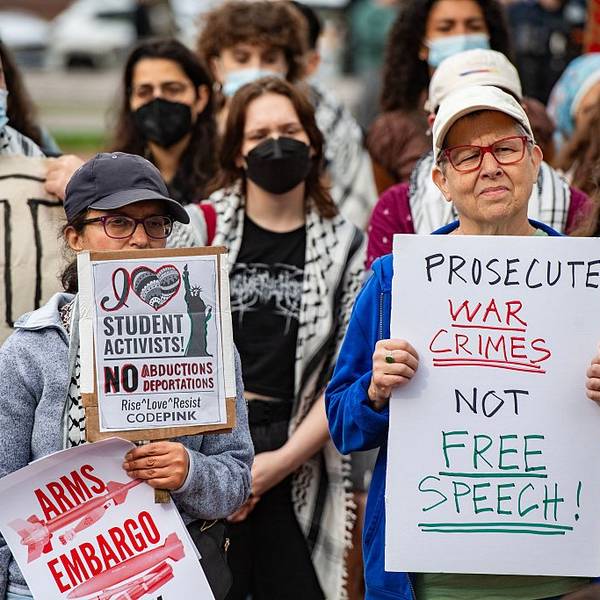In April, Jesús Escalona Mújicas, a 48-year-old construction worker near Bryan, Texas was grabbed, detained, and ultimately deported in shackles to Venezuela under false charges that he was a member of the Tren de Aragua gang.
His story was detailed last week by the Texas Observer. He’d worked for the same employer, a Venezuelan Pepsi affiliate, for nearly two decades, and had no criminal history or record of gang activity. They claimed his Air Jordans—a brand 24 percent of sneaker wearers in the U.S. reportedly own—were a symbol of gang membership.
Federal agents in President Donald Trump’s high profile military occupation of Washington, DC are zeroing in on food delivery drivers, many of them on mopeds, making them easy targets for abduction, the Washington Post reports. Gabriel Ravelo Torrealba, 22, needed hospital treatment for hand and leg injuries inflicted in his arrest. Christian Carías Torres, shot with a stun gun during his arrest, was branded a “suspected gang member,” an allegation, the Post noted, “the Trump administration has repeatedly used without providing evidence.”
Those rounded up by Immigration and Customs Enforcement (ICE) and other federal policing agencies are far from the “worst of the worst” boasted by Trump in his campaign mass deportation pledge. ICE’s own data shows 72 percent of those detained “have no known criminal convictions or pending criminal charges,” as Fortune magazine conceded in July.
To meet his arbitrary quota of seizures, deportation fanatic Stephen Miller scuttled any emphasis on the “worst” by racially profiling ordinary working people at Home Deport parking lots, farms, other work sites, and outside court hearings they’d attended to meet legal obligations. Numerous legal immigrants and even citizens continue to be grabbed. “The President does not want to see Haitians, Nicaraguans, Cubans, or Venezuelans here,” Escalona Mújicas said one of his arresting agents told him.
Similarly, in the DC operation, ICE and other federal agents are avoiding “the city’s high-crime areas,” New York Times columnist Jamelle Bouie wrote this week. “There are soldiers patrolling the National Mall; armored vehicles parked at Union Station; and ICE agents manning checkpoints on U Street, an area known for its bars, restaurants, and nightlife. They’re not there for safety, but for show.”
“If Trump is genuinely concerned about the safety of DC residents, I would see National Guard in my neighborhood. I’m not seeing it, and I don’t expect to see it,” one resident of DC’s Congress Heights neighborhood told Times reporter Clyde McGrady. “I don’t think Trump is bringing in the National Guard to protect Black babies in Southeast.”
Corollary consequences for the Gestapo-style raids and domestic military campaigns extend to the distortion of federal budget priorities. The DC occupation alone is costing $1 million a day, according to an analysis by Hanna Homestead of the National Priorities Project.
One less publicized provision of Trump’s “Big Beautiful Bill” was the gift of $75 billion in extra funding for ICE, “making it by far the highest-funded law enforcement agency in the federal government,” CBS News reported.
National Nurses United researchers found far more useful ways to allocate that funding rather than on terrorizing immigrant families and communities. For the same $75 billion, we could eradicate all medical debt accrued by 31 million people, cover over two years of universal pre-K for all 3 and 4 year olds in the US, pay for nearly all tuition and fees for students in public universities across the U.S., and substantially reduce the costs of child poverty in the nation or most of the homeless crisis in California. The same amount could also end both extreme and chronic hunger around the world for two years.
The militarization has a deeper, malevolent purpose, wrote Monica Potts in The New Republic this week. “Trump isn’t actually worried about crime. He’s not trying to make the district safer for its residents, and he’s certainly not weighing the data and evidence when he calls on governors to send guardsmen. Parading troops through an American city is a brazen authoritarian power grab.”
"There is not a crime crisis in D.C.," former DC Metropolitan reserve police officer Rosa Brooks who now teaches at Georgetown Law School told NPR, which reiterated Justice Department data that crime in Washington has plummeted with violence reaching a 30-year low last year. "This is police state territory, banana republic police state territory," Brooks said.
“This is what it means to learn to live in an authoritarian police state, and people are using the only tools they have: cell phones and sandwiches," notes Potts. “The longer ICE raids and military takeovers go on, the more they will inspire protests around the country, which may be the only excuse Trump is waiting for to claim that cities are full of disorder and then crack down even harder.”
Trump says he is targeting Chicago and New York next for his next Democratic majority-city occupations. He may also have in mind “an intimidation tactic to try to suppress voters in cities ahead of the 2026 midterm,” Potts observes. “It’s definitely part of Trump’s only true and unwavering project: consolidating power (Italics added). Even as he’s posting on Truth Social about crime in D.C., he’s cheering efforts in Texas to redraw district maps to elect more Republicans to the House next year and launching an effort to get rid of mail-in ballots.”
As with Trump’s march to autocratic power, the parallels with Hitler and Nazi Germany are unmistakable and should be chilling to everyone. Within two months of being handed power by the conservative old guard Weimar Republic in January 1933, Hitler made two major moves, as Peter Fritzsche describes in Hitler’s First Hundred Days.
First, he persuaded his conservative coalition partners to call for new elections by early March. Then, the Nazis engineered or at least exploited a fire in the Reichstag in late February, Germany’s Capitol building, to invoke emergency decrees. They served, Fritzsche notes, to “suspend civil liberties, expand protective custody” and other authoritarian powers that “symbolized the death of representative government and the rule of law.” It also gave the Nazis the opening to complete a takeover of German policing to engage in arrests, detention, and violent assaults on all political opposition.
Coupled with the election, in which the Nazis increased their political power through domination of the media, mobilization of state resources, demonization of their version of “enemies from within” (mainly Jews and Communists), and the traumatizing impact of an increased militarization, Hitler and the Nazis had the means to manufacture mass consent, silence dissent, and cement fascist rule.
Potts is unimpressed with much of the Democratic Party leadership response. She cites Senate Majority Leader Chuck Schumer’s dismissal of Trump’s takeover of DC as a “political ploy” and an “attempted distraction” from problems like the tariffs and Epstein files. But, she emphasizes, “the federal agents and troops are not the distraction. They are the whole point—quite literally the spear in Trump’s increasingly fascist assault on American democracy.”
Democratic leaders, Potts added on the Daily Blast podcast with Greg Sargent, “should start calling things like they see them and they should say, you’re not coming to our cities, you’re not coming to our towns with the military, you’re not going to turn this country into a dictatorship. The idea that there’s still time is really critical. And voters like it when elected leaders fight for them.”
That is the immediate challenge we face with Trump and Trumpism today.




